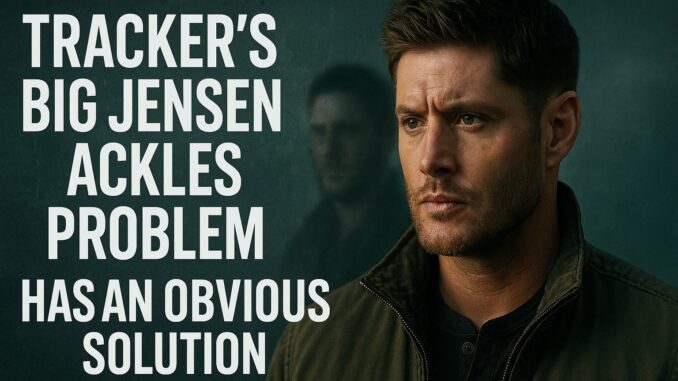
Introduction – The Trouble in Tracker’s Shaw Family Dynamic
Tracker wrapped up the first case that served as the main subject for the first two episodes of Season 3. It highlighted a sick and twisted gain of the manipulation of human behavior. In both episodes, Colter was joined by his older brother Russell, and they worked together wonderfully. This left fans clamoring for the show to become about a duo, not a lone wolf. In a final conversation in the episode, it seems Russell might be hinting to his brother that he’d like to keep things going, too. That has fans excited for the possibilities, as does a recent comment by the show’s executive producer. It also raises the question of what the show should do with Jensen Ackles: have him join Tracker, or send him into his own spinoff.
The way they work together is great. Plus, the brothers have so many lost years to catch up on. It’s unlikely that the focus of the show will change from being about Colter traversing the U.S. on his own, seeking out missing persons cases to solve for reward money. But based on how much the show has shifted over the first two seasons, it isn’t completely out of the realm of possibility.
If you’re a fan of the hit TV show Tracker you’ve likely noticed something unsettling lately: the inclusion of Jensen Ackles as Russell Shaw, brother to the lead character Colter Shaw, has all the makings of a dramatic boost—yet it’s also introducing a major issue. In this article, we’ll dig into what exactly that problem is, why it matters for the show’s future, and what the obvious solution is that could save it.
Who Is Jensen Ackles’ Character – Russell Shaw?
The Entry of Russell into the Shaw Universe
Jensen Ackles joined Tracker playing Russell Shaw, the estranged brother of the central protagonist Colter Shaw. His arrival promised rich emotional stakes, familial conflict and a chance to deepen the show’s mythology.
What Russell Adds to the Story
Russell gives the show a complementary foil to Colter’s character: where Colter is methodical and bounded by procedure, Russell brings military-honed instincts and a different moral code. That contrast had the potential to raise the dramatic stakes significantly.
The Problem: Jensen Ackles Is More of a Risk Than a Reward
The Show’s Anchor Is Shifting
Multiple critics argue that the show depends heavily on Colter Shaw (played by Justin Hartley). According to one breakdown, “the problem is, Tracker lives and dies with him… and by keeping him a pretty straightforward guy with no one to regularly bounce off of.” In other words: introducing Russell doesn’t just add dimension—it may inadvertently undermine the core character’s effectiveness.
Scheduling Conflicts and Fragmented Screen Time
Jensen Ackles’ availability is already constrained by his commitments (including other major projects) and that means his character may pop in and out. That irregular presence dilutes narrative momentum and distracts from the main arc.
Mixed Emotional Investment
Viewers who tuned in for the journey of Colter Shaw are now being asked to invest heavily in Russell too—but with less backstory and inconsistent appearances, it’s harder to engage. When you introduce a high-profile actor like Ackles, expectations rise. If the character doesn’t deliver fully, you lose trust.
The Risk of Overshadowing or Under-delivering
Having a star like Jensen Ackles can be both boon and burden: the star power draws in attention, but if his character doesn’t integrate fully, it creates impressions of “guest star stunt” rather than meaningful addition. Critics have already highlighted this. The show may risk leaning too much on Ackles and failing to develop him adequately.
Why This Problem Matters for Tracker’s Future
Viewer Retention and Character Loyalty
The show’s success depends on viewers staying engaged and emotionally invested. If the Shaw family dynamic feels unbalanced, the core story loses cohesion.
Narrative Consistency
When a major character is introduced but doesn’t have enough screen time, plot integration or story payoff, it weakens not just that character’s thread but the entire narrative fabric.
Show Identity Risk
Tracker’s brand is built on Colter Shaw’s mission and point of view. If Russell’s arc becomes too dominant—or too ancillary—it shifts the brand in ambiguous territory, risking alienation of the loyal audience.
Identifying the Obvious Solution
Make Russell a Permanent, Fully Developed Presence
The easiest fix? Commit to Jensen Ackles’ character long-term. Instead of intermittently dropping in Russell, give him a defined and consistent role across seasons. Make his back-story, motivations and relationship to Colter essential and ongoing. That builds investment and reduces the “guest star” problem.
Align Russell’s Arc With Colter’s—Not Opposed To It
Rather than a disconnected side-story, Russell’s purpose should intertwine with Colter’s mission. Their conflict, cooperation and shared history should feed into the main stakes, making them a unified focal point rather than two parallel ones.
Manage Scheduling and Expectations
If real-world scheduling is limiting Ackles’ availability, the showrunners should work around that: perhaps design the narrative in blocks where Russell is off-screen for strategic reasons, then bring him in with impact. Prefer quality of appearances over quantity of guest-shots.
Avoid Overshadowing the Core Lead
The show must preserve Colter as the pivot. Russell should enhance, not supplant, the central hero. Give Ackles’ character enough weight but stop short of turning the show into “Russell Shaw now.” Consistency without cannibalization.
Implementation – How the Writers Can Make It Work
Introduce Russell Early in Season Arcs
Start each new season by re-anchoring Russell into the mission. Perhaps a prologue showing him on a separate but related case, then team him with Colter. That gives viewers a reason to stay tuned for more.
Use Russell to Expand the Mythology
Russell’s background (military, covert operations etc) can open up new story playbooks for Tracker. Layers of government conspiracy, black-ops, family secrets—all can be leveraged to deepen the show’s world.
Leverage His Presence for Character Growth
Use Russell as a mirror for Colter: what if Colter’s approach fails and Russell’s doesn’t? What if Colter’s moral code is challenged by Russell’s pragmatism? That tension creates character arcs, not just plot.
Build Viewer Expectations Smartly
When fans see Jensen Ackles listed in the credits, they expect something substantial. Avoid “flash in the pan” returns. Instead promote “Russell will appear in episodes 3, 7, 11” or similar. That builds anticipation and trust.
Where Other Shows Went Wrong (and What Tracker Can Learn)
Guest Star overuse Pitfalls
Series that introduce big names but treat them as episodic attractions often lose momentum. The guest star becomes a gimmick rather than a component of story.
Support Character Leading the Show
When the support character starts dominating, it risks diluting the primary voice. Tracker risks this range shift unless handled carefully.
Integrate Rather Than Segregate
Instead of episodes where Russell pops in, the show should integrate him into every main thread: family drama, investigation, personal stakes. That creates cohesion.
Advantages of Fixing the Jensen Ackles Problem
Stronger Viewership Engagement
When Russell’s role is meaningful and consistent, fans stay invested. They’re watching not just for the case of the week but for “what will Russell do next.”
Richer Character Dynamics
The family triangle—Colter, Russell and their mother/father back-story—becomes much more compelling when each piece has weight.
Broader Storytelling Canvas
Russell’s presence opens the door to military, intelligence, and global threads, which can expand the series’ appeal beyond purely domestic missing-persons cases.
Leveraging Star Power Smartly
Jensen Ackles is a name that brings attention. Use it well to attract new viewers and deepen the existing base.
Potential Risk Factors and How to Mitigate Them
Budget and Scheduling Constraints
Ackles’ availability may be limited. Solution: pre-shoot blocks, plan arcs around his calendar, ensure episodes without him still advance core story.
Narrative Overload
Too many storylines (Colter’s mission, Russell’s back-story, family secrets) could confuse viewers. Solution: streamline each season around 2-3 major arcs, with Russell’s involvement clearly defined.
Creating Meaningful Episodes
Avoid the trap of Russell showing up just to shake things up. Each appearance must serve a purpose: advance plot, reveal character, raise stakes.
Balancing Fans vs. New Viewers
Existing fans may resist change; new viewers may be unacquainted with Russell’s back‐story. Solution: weave in arcs that welcome new viewers (Russell’s mission) while satisfying long-time watchers.
A Vision of What Success Looks Like
Season Preview with Russell as Co-Lead
Imagine Season 4 begins with Russell on assignment in Europe, uncovered intel leads back to the same conspiracy Colter is investigating—thus syncs their stories. Viewers are hooked from episode 1.
Emotional Payoffs
By mid-season, show a scene where Russell rescues Colter in a moment of weakness. Simple, effective.
Bigger Stakes, Bigger World
Perhaps Russell’s military past connects to “The Process” (the underground group in Tracker’s mythology). That opens a new level of threat.

Viewer Buzz and Social Media Engagement
With strong arcs, Russell’s fandom (Ackles is beloved) will ignite chatter: episode breaks that center on him will trend on social platforms, boosting exposure.
Closing Thoughts – The Bottom Line
The inclusion of Jensen Ackles as Russell Shaw is a strong move by Tracker—but only if handled strategically. The current problem is simple: his role is neither fully integrated nor consistently substantive. That creates a disconnect. The obvious solution is to commit to him, align his arc with the core lead, manage his screen time smartly, and treat him as a permanent asset rather than a flashy cameo. Do that, and Tracker can harness both the star power and the narrative depth to elevate the series rather than dilute it.
Conclusion
To wrap this up: Yes—Tracker has a Jensen Ackles problem, but it’s hardly insurmountable. The moment the writers, producers and network decide to treat Russell Shaw as essential rather than “added flavor,” the show will shift gears in a majorly positive way. It’s about integration, not interruption. It’s about story depth, not star drop-ins. If they commit to that, the show doesn’t just survive—it thrives. And the audience wins.